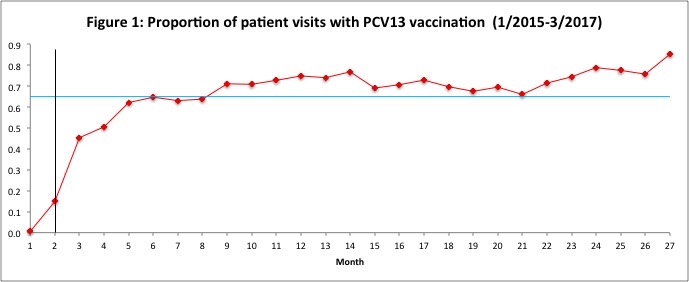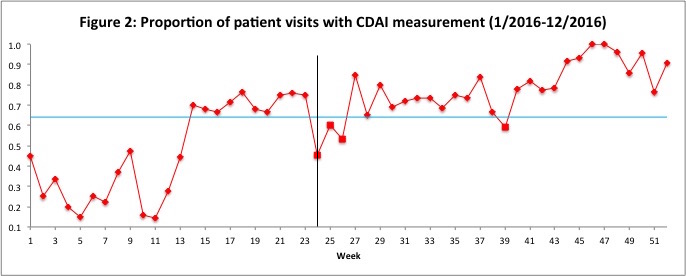Session Information
Session Type: ACR Concurrent Abstract Session
Session Time: 2:30PM-4:00PM
Background/Purpose: Vulnerable populations with autoimmune rheumatic diseases are at higher risk for disparities in care. To address these health inequalities we developed and evaluated 2 initiatives at an adult rheumatology clinic, which is the safety net for a diverse, urban population. We used the Institute for Healthcare Improvement (IHI) Model for Improvement to implement and assess pneumococcal (PCV13) vaccination among patients receiving immunosuppression and rheumatoid arthritis (RA) disease activity measurement.
Methods: Performance on the PCV13 vaccine was calculated as the proportion of patients receiving immunosuppression who were vaccinated. The RA disease activity measurement was the percentage of patients with outpatient RA encounters who received a clinical disease activity index (CDAI) score. For PCV13 vaccination, our clinic team utilized an interdisciplinary conference and nurse-led physician chart reminders (starting 2/2016). For RA disease activity, we reconfigured the electronic health record and utilized quarterly physician performance feedback (starting 6/2016). Control charts were used to examine performance of these measures over time. Vertical lines indicate time points of quality initiatives as described above. A series of at least 8 data points over the control limit (horizontal line) was indicative of significant improvement.
Results: The patient population studied had a median age of 58; 73% were women and 89% were racial/ethnic minorities. Over a 27-month period, PCV13 vaccination rates increased from 0.6% to 85% (Figure 1). Over a 12-month period, documentation of CDAI measurement at clinic visits increased from 45% to 91% (Figure 2).
Conclusion: Both quality initiatives were successful in significantly increasing pneumococcal vaccination rates and RA disease activity documentation. Using the IHI Model for Improvement and an intraprofessional team approach, we were able to dramatically improve performance on two important measures of health care quality for patients with rheumatic diseases.
To cite this abstract in AMA style:
Aguirre A, Trupin L, Margaretten M, Goglin S, Yazdany J. Effective Implementation and Evaluation of Quality Improvement Initiatives in a Safety Net Hospital Rheumatology Clinic [abstract]. Arthritis Rheumatol. 2017; 69 (suppl 10). https://acrabstracts.org/abstract/effective-implementation-and-evaluation-of-quality-improvement-initiatives-in-a-safety-net-hospital-rheumatology-clinic/. Accessed .« Back to 2017 ACR/ARHP Annual Meeting
ACR Meeting Abstracts - https://acrabstracts.org/abstract/effective-implementation-and-evaluation-of-quality-improvement-initiatives-in-a-safety-net-hospital-rheumatology-clinic/


